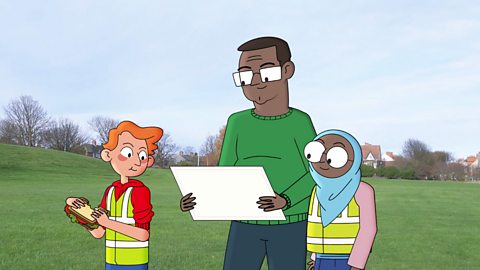Watch: Introduction to researching fieldwork
Play the video to watch Ayesha and James visit a park to research their fieldwork investigation.
James: Ayesha, have you chosen what you want to find out during our visit?
Ayesha: There are so many things that I want to know! I could ask people if they enjoy coming to the park. If they think it's a nice place to be. Or if they would like to come to the park more often.
James: I suppose all the answers to those questions will be either 'yes' or 'no'. Like, 'Yes the park is a nice place to be'. Or, 'No, I don't enjoy coming to the park'.
Ayesha: Exactly! They're closed questions. That's when people have a list of answers to choose from.
James: I was going to ask people why they like coming to the park. You can't answer 'yes' or 'no' to that though, because there will be lots of different answers.
Ayesha: So it's an open question because that answer could be anything. For example: 'I like playing football'. Or 'I like to sit and read'.
James: You can count your 'yes' and 'no' answers. Just like I'm counting the number of spiders crawling up your leg!
Ayesha: Oh. What!?
James: Just kidding…
Ayesha: Phew!
James: My answers are going to be hard to count though.
Ayesha: My answers are easy to count. So it's simpler for me to create my graphs.The numbers I'll be collecting are called 'quantitative' data.
James: My data will be 'qualitative', which means it's tricky to count because there could be loads of different opinions as answers.
Ayesha: Hmm, that's going to be tricky to show in a graph, isn't it?
James: I could make it easier if I give people a list of answers to choose from.
Ayesha: Or you could draw a picture of all the things people like, or do some creative writing.
James: Whatever we do, we must stay safe. We should make sure we're always with the group in the park, and away from the road.
Ayesha: Yeah, it's important to think about the risks when you're out and about!Watch out!
James: Oh!
Fieldwork tips

Image caption, Planning your research
If you want to present your data in a table or graph you need to think of the types of questions you will ask.

Image caption, Researching your investigation
Remember the types of questions you could ask people – open or closed.

Image caption, Closed questions
Closed questions need a ‘yes’ or ‘no’ answer.

Image caption, Open questions
It's easier to make a chart if you write a list of answers for people to choose from.

Image caption, Data
Think about how you'll show your data so that it's easy to understand.
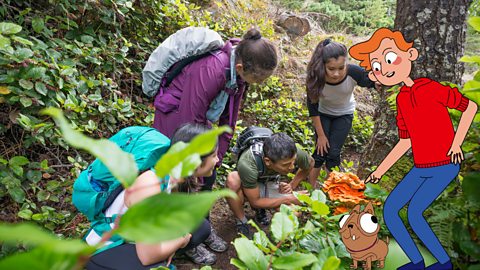
Image caption, Staying safe
Always stay safe during fieldwork. Keep away from the road and stay with the group.
1 of 6
To carry out your investigation, you need to think about:
- what you want to find out
- what type of questions you will ask – open or closed
- what type of data you will collect – qualitative or quantitative
What is a closed question?
To find out people’s views during your fieldwork, you need to think of what types of questions to ask.
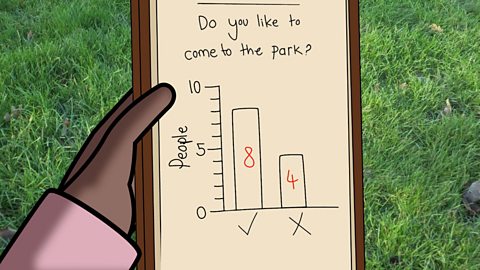
A closed question is where the answer is either yes or no, such as:
- Do you like to come to the park?
- Do you think dogs should be allowed in the park?
- The data you get from closed questions is called quantitative data.
- You can count the number, or quantity of people who have answered ‘yes’ and ‘no’.
- This kind of data is easy to make into a graph.
What is an open question?
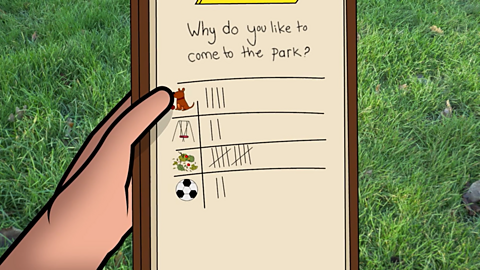
Open questions are where the answer could be anything, such as:
- What do you like best about the park?
- Why do you like to come to the park?
- The data you get from open questions is called qualitative data.
- It is measured by the quality, not the quantity.
- This type of data is hard to make into a graph, unless you make a list of answers to choose from.

Activities
Activity 1: Make your own questionnaire

See if you can design a questionnaire using either open or closed questions to try out on friends and family and then make a graph from the results.
Activity 2: Quiz – Researching fieldwork
SATs preparation resources. activitySATs preparation resources
Get ready for the SATs papers with videos, activities, quizzes and games to refresh your knowledge and practise your skills.

More on Fieldwork
Find out more by working through a topic
- count10 of 12
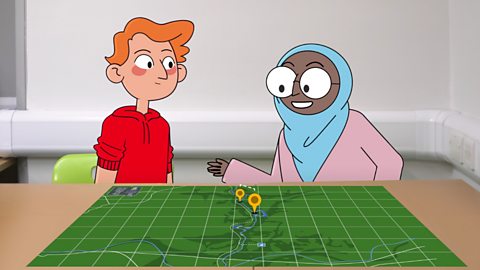
- count11 of 12
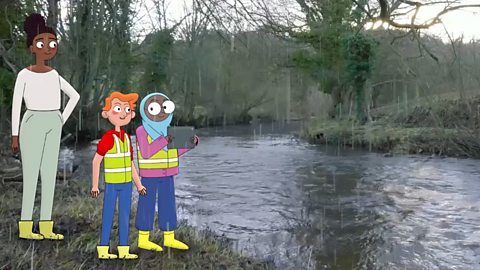
- count1 of 12
